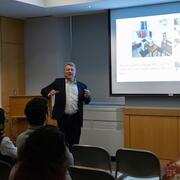
In Africa and Middle East, HSPH researchers examine links between environment and health
By Chris Sweeney
Dust storms in Kuwait. Tourism in Tunisia. Air pollution in Uganda. Three different countries facing three different challenges. A common thread? Harvard T.H. Chan School researchers are working in each setting to understand how environmental factors are impacting the health of the people who live and work in these regions.
At a panel discussion on "Environmental Health Capacity Building In Africa And The Middle East" held on October 25, 2018 as part of Harvard Worldwide Week, attendees were given a look at these ongoing research projects.
"Developing countries in Africa and the Middle East are bearing a disproportionate health burden from climate change and environmental contamination," said Douglas Dockery, John L. Loeb and Frances Lehman Loeb Research Professor of Environmental Epidemiology. "For this panel we brought together three investigators across Harvard who are partnering with institutions in this region to build local capacity to address these challenges."
The event, hosted by the Department of Environmental Health and the Harvard Chan-NIEHS Center for Environmental Health, kicked off with a presentation from Petros Koutrakis, professor of environmental sciences and an expert on air pollution. Koutrakis shared an overview of his work in the Middle East, which dates back to the 1990s when he and colleagues assessed the environmental health impacts of the hundreds of oil wells that were set ablaze during the Gulf War.
More recently, Koutrakis has turned his attention to dust storms in Kuwait, a fairly common meteorological event that may have a significant impact on human health and social dynamics. Using satellite data, historical weather records, and air quality sensors, Koutrakis and colleagues are gleaning new insights on how desert vegetation and wind patterns affect the severity and frequency of dust storms.
"Dust is not something we can control, and so people have to adjust," Koutrakis said, noting that these adjustments can impact human activity and health. For instance, on days when dust storms are severe, people may be forced to stay indoors, reducing their ability to exercise. There is also the potential that exposure to dust storms over long periods of time may be associated with chronic respiratory problems.
Koutrakis was followed up by Misbath Daouda, a master's candidate in environmental health who's studying how the growing tourism industry in Tunisia may impact the local environment.
Daouda's research so far has shown that in some tourism hot spots, electricity demand surges by more than 50% during the busy season and that the sector is responsible for more than one-third of water consumption in Djerba, an island oasis off the eastern coast of Tunisia. As Daouda explained, her hope is to build a framework to measure tourism growth and its impact on the environment and human health in order to assist policymakers who will have to wrestle with important choices on how to mitigate the sector's impact in the North African country over the coming years.
Rounding out the event was a presentation from Crystal North, a pulmonologist at Massachusetts General Hospital who has been collaborating with Harvard Chan School researchers to study air pollution in Uganda.
The work involves tracking air quality and following a cohort of HIV-positive and HIV-negative patients in the East African nation. Among the challenges are the air quality data from developing countries are relatively sparse, and there are very few sensors in Uganda to measure ambient air quality.
Previously North's research has looked at inflammation and lung function in HIV-positive patients, who tend to be at increased risk of tuberculosis. She hopes to build on that with this new research by focusing on whether air pollution and HIV are synergistic in their effects on lung function. "Hopefully in the next year or two we'll have some initial results to share," North said.